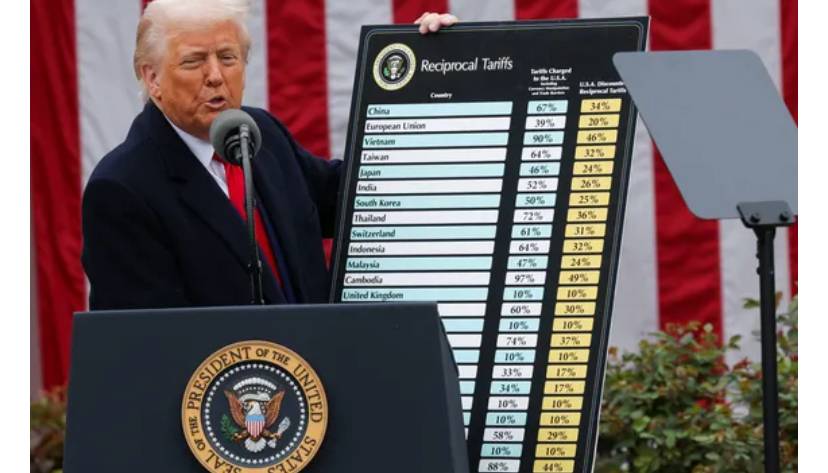Global Alarm as Trump’s Tariffs Spark Fears of Trade War and Soaring Prices
Former U.S. President Donald Trump’s sweeping new tariffs have triggered a wave of global condemnation and economic anxiety, raising concerns of a full-blown trade war and skyrocketing consumer prices in the U.S. and beyond. Announced on Wednesday, the tariffs include a blanket 10% levy on all imports into the United States, alongside steeper, targeted duties on key trading partners such as China and the European Union.
The unprecedented scale of the tariffs—hailed by Trump as a negotiating tool but condemned by critics—has not been seen in over a century. While Trump insisted they would give the U.S. greater leverage in global trade talks, there was confusion over whether these measures are permanent or part of a broader strategy to pressure other countries into concessions. His comments contradicted those of Commerce Secretary Howard Lutnick and trade adviser Peter Navarro, both of whom indicated the tariffs were final.
Markets responded with alarm. Stock exchanges around the globe plunged on Thursday, marking the worst day in years for major U.S. indices. The Dow Jones Industrial Average dropped nearly 4%, the S&P 500 fell close to 5%, and the Nasdaq tumbled 6%—its worst performance since the COVID-19 crash in March 2020. The U.S. dollar weakened, and oil prices also took a hit, indicating widespread investor concern about economic stability.
U.S. consumers may soon feel the impact directly. Analysts at Rosenblatt Securities predict that the cost of a high-end iPhone could reach as much as $2,300 if Apple shifts the burden of the new tariffs to buyers. Other everyday goods like running shoes, cannabis products, and electronics are also expected to become more expensive.
U.S. businesses are already adapting. Automaker Stellantis announced temporary layoffs for American workers and plant closures in Canada and Mexico. General Motors said it plans to boost domestic production to sidestep the tariffs, illustrating the sudden pressure on global supply chains.
The international response has been swift and critical. Canadian Prime Minister Mark Carney accused the U.S. of walking away from its traditional role as a leader in economic cooperation and announced limited countermeasures. In Europe, French President Emmanuel Macron urged EU countries to suspend investments in the United States, while the bloc prepared its own response to the 20% tariffs it now faces.
China, targeted with a staggering 54% tariff, vowed to retaliate, raising fears of escalating tensions between the world’s two largest economies. Meanwhile, Japan’s Prime Minister Shigeru Ishiba labeled the situation a “national crisis,†underscoring the gravity of the challenge for one of America’s closest allies and biggest investors.
The IMF weighed in as well, with Managing Director Kristalina Georgieva warning that the tariffs pose a serious risk to the already sluggish global economy. She called on the U.S. and its trading partners to find peaceful solutions to reduce uncertainty and avoid worsening the economic climate.
Asian markets continued to suffer as Japan’s Nikkei fell another 1.85% on Friday, following a 2.8% loss the day before. Chinese markets remained closed due to a national holiday, delaying their response to the unfolding crisis.
In summary, Trump’s aggressive tariff policy has thrown global markets into turmoil, sparked political backlash, and introduced major economic uncertainty. With inflation looming and international tensions rising, the world is bracing for what could be a prolonged and painful period of trade instability.


